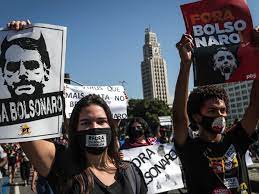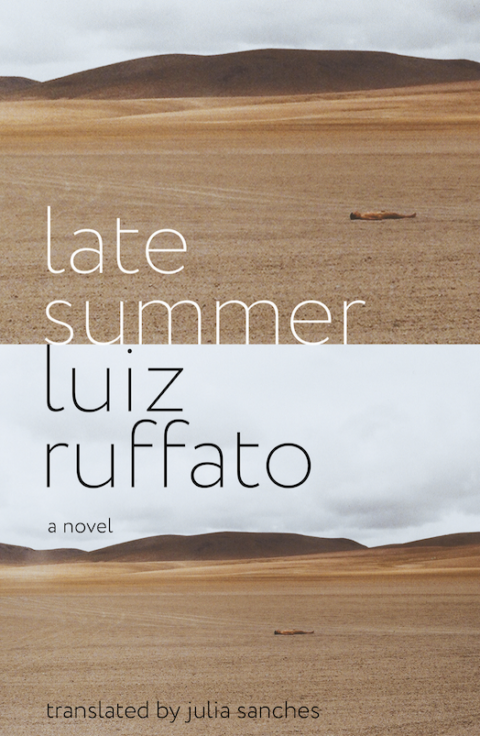As the coronavirus pandemic has smoldered and blazed over the past 19 months, killing more than four million people worldwide, death has remained stubbornly, cruelly, and heartbreakingly inescapable. Few countries have suffered as much as Brazil, where President Jair Bolsonaro’s hands-off approach has allowed the death toll to soar past 500,000, second only to the total in the United States (where another vainglorious politician’s willful ignorance also abetted the virus for months). Brazil’s poorest citizens have suffered the most under Bolsonaro’s policies, having to contend with not only the virus but also increased evictions and skyrocketing unemployment rates. But the pandemic didn’t create the economic divide in Brazil — it merely exacerbated it. Despite the success of anti-poverty initiatives during the administration of former-President Luiz Inacio Lula da Silva from 2003 to 2011, tens of millions of Brazilians have been living in extreme poverty for decades.
 The author Luiz Ruffato was born into that poverty, to a “lower-lower middle-class” family in 1961, the child of an illiterate washerwoman and a popcorn salesman. Committed to become a writer, he made a firm decision to tell the stories of this disregarded demographic in his fiction. The mournful and ruminative novel Late Summer — translated from the Portuguese by Julia Sanches — does exactly that, following a character with a background similar to Ruffato’s. During six days in March 2015, Oséias Moretto Nunes, aged 53 (to Ruffato’s 54 in that same month) wanders through Cataguases, a working class town in southeastern Brazil, about 100 miles north of Rio de Janeiro, where he (and Ruffato) grew up.
The author Luiz Ruffato was born into that poverty, to a “lower-lower middle-class” family in 1961, the child of an illiterate washerwoman and a popcorn salesman. Committed to become a writer, he made a firm decision to tell the stories of this disregarded demographic in his fiction. The mournful and ruminative novel Late Summer — translated from the Portuguese by Julia Sanches — does exactly that, following a character with a background similar to Ruffato’s. During six days in March 2015, Oséias Moretto Nunes, aged 53 (to Ruffato’s 54 in that same month) wanders through Cataguases, a working class town in southeastern Brazil, about 100 miles north of Rio de Janeiro, where he (and Ruffato) grew up.
Oséias is terminally ill, given six months to live — maybe more, maybe less — and urged to take advantage of his remaining time. His doctor tells him, “Try to live life to the fullest. Do something you’ve always dreamed of doing. Is there anything you’ve always dreamed of doing?” Oséias certainly has regrets, but he doesn’t have a bucket list. Instead he embarks on a nostalgia tour of sorts, returning to his hometown and his estranged family for the first time in nearly two decades, not to garner sympathy — he never mentions his diagnosis — but simply to see and to remember. What he finds, and part of what overwhelms him, is the crushing poverty ravaging Cataguases, “a place so changed that it seemed to hold no trace of the person I’d once been.”
Written as an exhaustive diary, the text relates every observation Oséias makes, every recollection he has, every action he takes, down to the unzipping of his pants in the bathroom. The narrative forms free-flowing paragraphs of spontaneous expression that reset only when Oséias awakes, whether in the morning or after a nap necessitated by his exhaustion. We don’t know how long ago Oséias was diagnosed, but we quickly realize how sick he is. He’s emaciated, he vomits often, and he tells everyone that he quit smoking eight years ago. He carries only a small backpack, containing “everything I need,” which for most of the novel is nothing more than a change of clothes and a vitamin tube of cash, which he diligently portions into his wallet each day.
Isolated by events during his youth, which trickle out over the course of the novel, Oséias “lost interest in other people’s fates,” including those of his family, once he met Marília, his now ex-wife. She never even set foot in Cataguases, and Oséias was “so submissive” that he “never took [his son] Nicolau to receive his grandmother’s blessing, not even by force.”
 While Oséias does not express any desire to reconnect with Marília or Nicolau, he seeks out the siblings that he hasn’t seen for 19 years, stopping first at the house of his sister Rosana. Her teenaged daughter, Tamires, is thrilled to see her uncle, but Oséias is reserved and won’t open up to her. We learn that his relationship with Rosana is strained, not only because of his past behavior, but because of her husband, Ricardo. When Rosana was younger, Ricardo’s mother took her under her wing, exposing her to an entirely different economic class, one made possible, if Oséias’s recollections are to be believed, by criminal behavior. Rosana and Oséias manage to overcome their differences at times, but there is little candor, and when he leaves, it is without a proper goodbye.
While Oséias does not express any desire to reconnect with Marília or Nicolau, he seeks out the siblings that he hasn’t seen for 19 years, stopping first at the house of his sister Rosana. Her teenaged daughter, Tamires, is thrilled to see her uncle, but Oséias is reserved and won’t open up to her. We learn that his relationship with Rosana is strained, not only because of his past behavior, but because of her husband, Ricardo. When Rosana was younger, Ricardo’s mother took her under her wing, exposing her to an entirely different economic class, one made possible, if Oséias’s recollections are to be believed, by criminal behavior. Rosana and Oséias manage to overcome their differences at times, but there is little candor, and when he leaves, it is without a proper goodbye.
This pattern will be repeated, with varying degrees of tenderness and apathy, at the houses of his sister Isinha and his brother, João Lúcio. These two dramatically embody the extreme societal divisions in Cataguases and Brazil. Isinha had a shotgun wedding, “pregnant in her veil and garland, at São José Operário Church.” João Lúcio turned a youthful hatred of his father into an early emancipation, getting pseudo-adopted by his mother’s Italian family who lived in the countryside northwest of Cataguases. When Oséias visits, Isinha is making counterfeit jeans, changing out labels of name brands while watching her son Diego’s two toddlers, born 22 days apart to two different women; João Lúcio is rich, living a life of luxury, and on his way to buying up all the property once owned by his mother’s extended family. When Oséias asks Isinha, before leaving for their brother’s place, if João Lúcio is happy, she answers as so many very poor people likely would, “You’ve got to be dumb to be rich and sad. Goodness! If I was rich, I’d be the happiest person in the world.”
Aside from his siblings, Oséias encounters several old friends and acquaintances in Cataguases, often resulting in more introspection and dejection than his family prompts, as when he bumps into his first girlfriend on the streets of Cataguases: “What I’d give to start from the beginning, from scratch. And still. . .Still, I haven’t got long left…Jesus, I’m going to die and never …”
Despite the invocation, Oséias stopped going to mass years back to avoid confessing a secret from his childhood. In Cataguases, he fitfully tries to make the confession, only to be met with locked churches. Heading back to his hotel after one attempt, he finds his old art teacher, Mr. Mendonça, smoking in his yard near the bus stop:
“Aha, the bus stop! Fixed to a wood post, a white circle with a red outline and the word Ônibus written in black, bullet holes in the O and B. On one side, a boteco, Beira Bar, its steel door shut. On the other, a vacant lot. I stand and anxiously wait. I need to wash my hands. Somewhere, there is the song and clapping of an evangelical service. The scent of ripe mango and cigarette smoke tickles my nose. I notice, then, an ember glowing at the mouth of a man leaning over a low cement-board wall.”
The teacher is touched that Oséias recognizes him — and is so lonely — that he invites him in. Oséias accepts the invitation but regrets his decision immediately, resulting in one of the most devastating and revealing scenes in the novel. Despite his own bitterness and resignation, Mr. Mendonça tries to get Oséias to learn from his experiences:
“Dear boy, listen carefully to this old man who’s been through all kinds of things in life. Don’t let the past consume you. The past isn’t real. We’ve made it up. What exists is the present. This moment, here and now. Hic et nunc …Nothing else …There is no past, no future. Just present. Carpe diem!”
 But Oséias has no present, and so is drawn to the familiarity of his youth. After an early attempt to talk to the town’s mayor, who was a childhood friend, he reflects on the accomplishments of those he used to know: “They all did well … Turned things around for themselves … And here I am, without a pot to piss in. What have I ever done with my life? Maybe if I’d stayed here … Maybe … No, I couldn’t have stayed.”
But Oséias has no present, and so is drawn to the familiarity of his youth. After an early attempt to talk to the town’s mayor, who was a childhood friend, he reflects on the accomplishments of those he used to know: “They all did well … Turned things around for themselves … And here I am, without a pot to piss in. What have I ever done with my life? Maybe if I’d stayed here … Maybe … No, I couldn’t have stayed.”
The reason he couldn’t have stayed has to do with his unconfessed confession and his sister Lígia, who died 40 years earlier, when Oséias was 13. The circumstances surrounding her death constitute one of the novel’s two narrative mysteries, and as such it would be unfair to discuss them here, but suffice it to say, Lígia’s death destroyed Oséias’s family and haunts him still. After Mr. Mendonça’s exhortation above, Oséias tells him, “I died with Lígia … And this is what I’ve become. A body without a soul. That longs for… and fears … the end …”
Oséias doesn’t display concrete signs of that fear very often, instead existing in a sort of perpetual horror at what his life, and the life of his country, have become: “The places, trees, and houses are the same as when I was a kid—but not the faces, or the cars, or the motorcycles. I’m a frightened ghost barreling into bodies that move restlessly through the past.” Everything he sees leads to despair, focused on the belief that he and his country are condemned, heading down “a dead-end street, one mistake leading to another, fifty-three years down the drain.”
[Published by Other Press on July 6, 2021, 288 pages, $15.99 paperback]